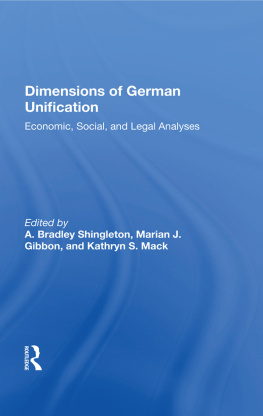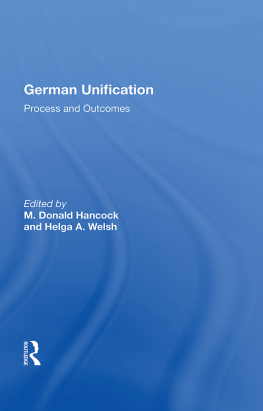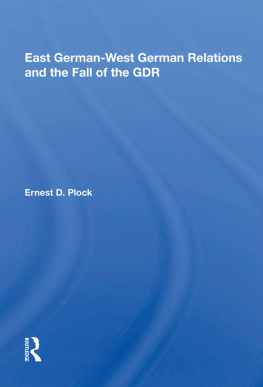Dimensions of German Unification
Published in cooperation with
The Robert Bosch Foundation, GmbH,
and
The Robert Bosch Foundation Alumni Association
First published 1995 by Westview Press
Published 2018 by Routledge
52 Vanderbilt Avenue, New York, NY 10017
2 Park Square, Milton Park, Abingdon, Oxon OX14 4RN
Routledge is an imprint of the Taylor & Francis Group, an informa business
Copyright 1995 by Taylor & Francis
All rights reserved. No part of this book may be reprinted or reproduced or utilised in any form or by any electronic, mechanical, or other means, now known or hereafter invented, including photocopying and recording, or in any information storage or retrieval system, without p ermission in writing from the publishers.
Notice:
Product or corporate names may be trademarks or registered trademarks, and are used only for identification and explanation without intent to infringe.
A CIP catalog record for this book is available from the Library of Congress.
ISBN 0-8133-8875-9
ISBN 13: 978-0-367-01688-3 (hbk)
To the Kuratorium of the Robert Bosch Foundation in grateful appreciation of a decade of support for the promotion of German-American relations
Contents
PART ONE
German Unification: Economic Aspects
, Marian J. Gibbon
Frederick R. Fucci
, Mark J. Jrolf
, Adam S. Posen
, Colette Mazzucelli
Michael Zumwinkle
PART TWO
German Unification: Social and Cultural Consequences
, Kathryn S. Mack
, Thomas A. Hagemann
, Angela Kurtz Mendelson
, Lauren Stone
, Bradden Weaver
PART THREE
German Unification: Comparative Legal Issues
, A. Bradley Shingleton
, Sylvia Becker
, Christopher S. Visick
, Ingrid L. Lenhardt
PART FOUR
Alumni Conference Speeches
, Kurt Biedenkopf
, Karsten D. Voigt
, Yilmaz Karahasan
For each of the past ten years, the Robert Bosch Foundation has invited fifteen highly qualified young Americans for a nine-month stay in Germany. The fellows have educational backgrounds and professional experience in law, business, public administration, and international relations. Their stay in Germany is not academic but, rather, allows them to acquire practical experience in the German federal and state government, business, and media.
Since 1989 the Robert Bosch Fellows have shown a special interest in the realities of life in unified Germany and have frequently selected internships in the new federal states. In the past, issues of security policy and the Atlantic Alliance occupied their interest. They have now become increasingly involved in issues of environment, immigration policy, education, health care policy, and intersocietal conflictareas that offer opportunities for fruitful interaction between the United States and Germany.
The 130 former fellows constitute a notable group, many pursuing successful careers not only in the United States but also in Germany and Europe. Many have remained personally and professionally involved with promoting and improving German-American relations.
Through the fellowship program, the Robert Bosch Foundation has demonstrated its thankfulness to the American people, who have magnanimously helped the Germans to overcome two dictatorships and to return to the community of free and democratic nations.
We thank the editors of this book, A. Bradley Shingleton, Marian J. Gibbon, and Kathryn S. Mack, for publishing the third volume of essays by Bosch Fellows on the occasion of the tenth anniversary of the Bosch Fellowship Program. I would also like to thank Dr. Gale Mattox for her coeditorship of the first two volumes and A. Bradley Shingleton for his coeditorship of the second volume. On this anniversary of the Fellowship Program I also wish to thank the dedicated members of the Fellowship Selection Committee under the initial leadership of Martin Hillenbrand, former U.S. ambassador to Germany, under the subsequent leadership of John Rielly, president of the Chicago Council on Foreign Relations, as well as Wolfgang Linz, Steven Muller, Peter Pechel, and Maria Ramirez.
Without the personal engagement of the officials of the Robert Bosch Foundation and CDS International, Inc., in New York the Fellowship Program would not have been implemented successfully. To all of them, in particular Dr. Rdiger Stephan, Gunter Gerstberger, and Jacqueline von Saldem, I extend my sincere thanks.
Dr. Ulrich Bopp
Robert Bosch Foundation
Though Germanys political unification occurred extremely rapidly, its economic and social unification are being gradually and, in some respects, laboriously consummated. In this sense, unification has been a process rather than an event. The economic, cultural, and psychological dimensions of unification have, each in their own way, proven to be complex challenges to the energies and resources of the German people, their political leaders and policymakers. Unification has also been complicated by a series of external developments. A wrenching economic recession, the Gulf War, the massive task of recreating the economic and political systems of eastern Europe and the Commonwealth of Independent States (CIS), waves of cross-border immigration, the movement toward a more integrated Europe, the need to redefine security alliances: any single one of these developments alone would have created difficulties for Germany in the midst of dramatic change. Collectively, these and other developments have rendered German unification a greater challenge than it first appeared in 1990.
In spite of these difficulties, Germany has achieved a great deal through perseverance and sacrifice during the past four years. Although the new federal states may not yet be the blooming landscape Chancellor Helmut Kohl predicted in 1990, there is broad agreement that the geographic area they encompass will have the most modern economic infrastructure in Europe within this decade. Our hope is that this book will illuminate the challenges unification poses for Germany in economic, political, and social terms, and convey a sense of the achievements, and the costs, of unity.
This book is divided into three parts. The first part, introduced by Marian J. Gibbon, is concerned with the challenges of unifying the German economy while integrating it into the European Union and maintaining its competitive edge in the global economy. The second part, introduced by Kathryn S. Mack, addresses some of the social and cultural dimensions of unification. The final part, initiated by a brief overview of the legal dimension of German unification by A. Bradley Shingleton, includes chapters on three fields of German law. Although these chapters are not directly concerned with the process of unification, they provide insight into some of the philosophical presuppositions that underlie not only German law but also the German concept of a social market economy (Sozialmarktwirtschaft).
The Robert Bosch Foundation selects fifteen fellows each year on the basis of expertise in a particular field to spend nine months in Germany working in both federal and state government. Each fellow is required to produce an essay on a topic of his or her choice. The contents of this book were selected from papers submitted between 1991 and 1993.
The objective of the Robert Bosch Alumni Association in publishing this volume is to reinforce and further the purposes outlined in the association by-laws, which include:








